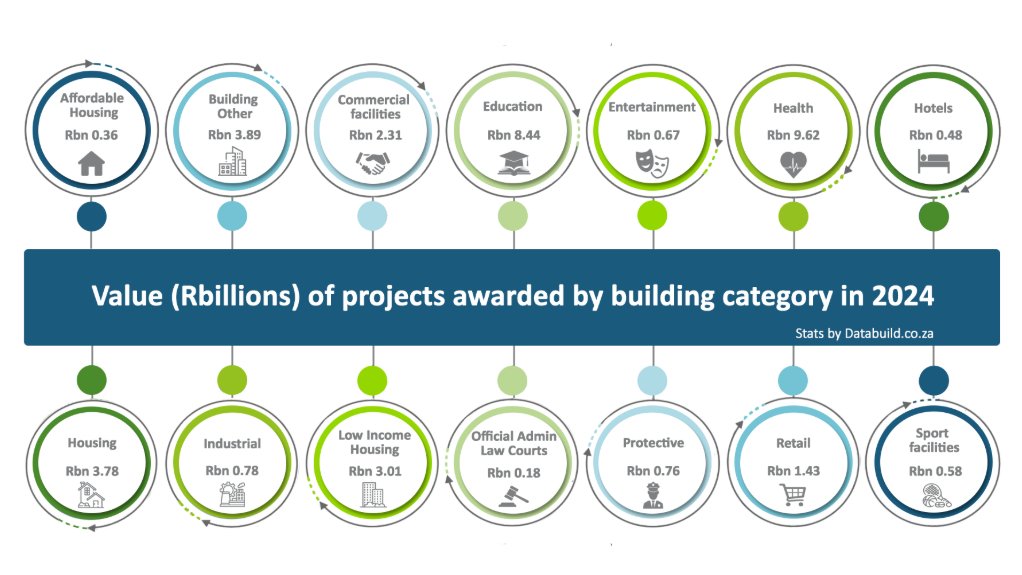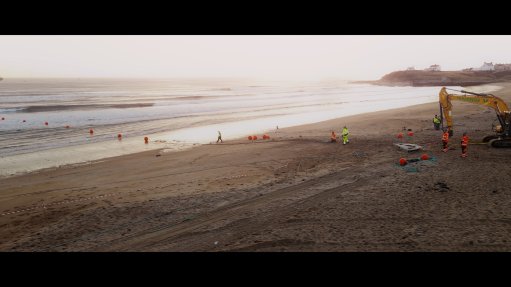Databuild reflects on a year of challenges and growth in the local construction sector
This article has been supplied.
From tackling systemic issues to embracing innovation, the construction sector in South Africa has shown remarkable resilience and adaptability in the face of mounting pressures. This is according to Databuild CEO Morag Evans as she reflects on the trends, challenges, and opportunities that are shaping the industry.
One of the most significant concerns is the continued disruptions brought about by criminal activity. For instance, construction mafias remain a persistent threat, costing the industry billions in delays and damages.
“Since 2019, approximately R68 billion has been lost due to these groups’ extortionate demands and violent disruptions,” says Evans. “This issue requires a united approach involving government, law enforcement, and the private sector to restore order and safeguard projects.”
Further compounding difficulties is the rise of tanker mafias, exploiting South Africa’s water scarcity to manipulate resources for profit. These criminal activities have exacerbated delays and raised concerns about public health and safety. “Criminality in both the construction and water sectors has highlighted the urgent need for stronger governance and better resource management,” she says.
Adapting through technology
Fortunately, the availability of advanced technologies provides a silver lining. The adoption of Construction Management Software (CMS) and other digital tools has proven instrumental in enhancing project efficiency and transparency.
“CMS platforms streamline planning and scheduling, improve communication across teams, and provide real-time analytics. Construction companies are leveraging these and other technologies to mitigate risks and optimise project delivery.”
Other examples include the use of drones, 3D printing, and digital twins. Evans says that these innovations enable real-time monitoring, better use of resources, and reduce waste. The construction sector’s gradual shift towards such technologies signals a promising move for sustainability and efficiency.
"Technology has also proven essential in fostering safer construction environments. Wearable devices monitor workers' health in real-time, while drones are increasingly used for site inspections, minimising risks in hard-to-reach areas. Digital platforms now streamline compliance reporting, ensuring that health and safety standards are not only met but exceeded,” adds Evans.
Putting health and safety first
With over 5,900 reported construction-related accidents in 2023, including 32.3% resulting from ‘struck by’ incidents, adherence to health and safety regulations has never been more critical.
“Ignoring these regulations is not an option. Non-compliance can lead to significant financial repercussions, reputational damage, and even criminal liability for company executives.”
To navigate these challenges, companies must focus on consistent training and visible enforcement of safety measures. Partnering with specialist consultants and leveraging new technologies are effective ways to mitigate risks.
Growing ESG interest
Environmental, Social, and Governance (ESG) principles have also gained traction during the past 12 months. These have helped drive the adoption of green building materials, waste reduction strategies, and renewable energy solutions. For example, recycled steel, eco-friendly concrete, and water conservation systems are becoming more prevalent across construction sites in the country.
“Even though adopting ESG practices aligns with global sustainability goals, it also provides construction companies with new opportunities for growth. Projects that prioritise ESG principles often attract investors and build trust with stakeholders.”
This year has seen a steady increase in projects that focus on renewable energy and sustainable infrastructure.
Key milestones
Despite the obstacles, this has been a resilient year for the industry. According to project stats published by Databuild:
- Across South Africa, the value of awarded projects in 2024 for civil reached R68 billion while non-residential building followed with R27 billion and residential building by R9 billion.
KZN’s awarded projects by value for civil, non-residential and residential was R23 billion.
Western Cape’s awarded projects by value was R17 billion.
Gauteng’s awarded projects by value was R16 million.
- The total number of cancelled and postponed projects across all provinces in 2024:
Civil = 721 projects.
Building (non-residential) = 564 projects.
Building (residential) = 108 projects.
- KZN experienced the greatest number of cancelled and postponed projects, with 385 projects. This was followed by Gauteng with 363 projects.
A positive for the industry is how offsite construction has gained momentum as a key trend. This method reduces waste and shortens project timelines, making it a cost-effective and sustainable solution for the future.
The year has also marked Databuild’s 50th anniversary. “From our humble beginnings as a lead-tracking service, we have evolved into an integrated data intelligence provider for the construction and allied industries. This milestone reflects our ability to adapt and grow alongside the industry we serve,” says Evans.
Future planning
As South Africa prepares for 2025, collaboration between public and private stakeholders becomes even more critical.
“The future of the construction industry in South Africa lies in its ability to innovate and collaborate. With a concerted effort, we can build a stronger, more sustainable industry that contributes to economic growth and social development.”
Article Enquiry
Email Article
Save Article
Feedback
To advertise email advertising@creamermedia.co.za or click here
Comments
Announcements
What's On
Subscribe to improve your user experience...
Option 1 (equivalent of R125 a month):
Receive a weekly copy of Creamer Media's Engineering News & Mining Weekly magazine
(print copy for those in South Africa and e-magazine for those outside of South Africa)
Receive daily email newsletters
Access to full search results
Access archive of magazine back copies
Access to Projects in Progress
Access to ONE Research Report of your choice in PDF format
Option 2 (equivalent of R375 a month):
All benefits from Option 1
PLUS
Access to Creamer Media's Research Channel Africa for ALL Research Reports, in PDF format, on various industrial and mining sectors
including Electricity; Water; Energy Transition; Hydrogen; Roads, Rail and Ports; Coal; Gold; Platinum; Battery Metals; etc.
Already a subscriber?
Forgotten your password?
Receive weekly copy of Creamer Media's Engineering News & Mining Weekly magazine (print copy for those in South Africa and e-magazine for those outside of South Africa)
➕
Recieve daily email newsletters
➕
Access to full search results
➕
Access archive of magazine back copies
➕
Access to Projects in Progress
➕
Access to ONE Research Report of your choice in PDF format
RESEARCH CHANNEL AFRICA
R4500 (equivalent of R375 a month)
SUBSCRIBEAll benefits from Option 1
➕
Access to Creamer Media's Research Channel Africa for ALL Research Reports on various industrial and mining sectors, in PDF format, including on:
Electricity
➕
Water
➕
Energy Transition
➕
Hydrogen
➕
Roads, Rail and Ports
➕
Coal
➕
Gold
➕
Platinum
➕
Battery Metals
➕
etc.
Receive all benefits from Option 1 or Option 2 delivered to numerous people at your company
➕
Multiple User names and Passwords for simultaneous log-ins
➕
Intranet integration access to all in your organisation



















